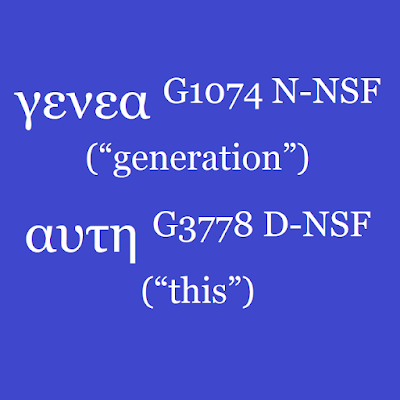Haven’t you heard your Koine Greek experts saying the phrase “this generation” in Mat 24:34; Mar 13:30; and Luk 21:32 means “YOUR (where you are a human being living in the 21st century) generation” or whichever generation during which they claim the events of those chapters would come to pass?
- All the scripture citations in English are from the King James Version
- the Greek text used is the Byzantine Text, though any other Greek text won't make any difference.
- Strong's Numbers and Robinson's Morphological Codes of only those words relevant to this discussion are retained in the scripture citations.
“This generation” in The Olivet Discourse
Mat 24:34: Verily I say unto you, ThisG3778 generationG1074 shall not pass, till all these things be fulfilled.
Mat 24:34: αμην λεγω υμιν ου μη παρελθη η γενεαG1074 N-NSF αυτηG3778 D-NSF εως αν παντα ταυτα γενηταιMar 13:30: Verily I say unto you, that ThisG3778 generationG1074 shall not pass, till all these things be done.
Mar 13:30: αμην λεγω υμιν οτι ου μη παρελθη η γενεαG1074 N-NSF αυτηG3778 D-NSF μεχρι ου παντα ταυτα γενηταιLuk 21:32: Verily I say unto you, ThisG3778 generationG1074 shall not pass away, till all be fulfilled.
Luk 21:32: αμην λεγω υμιν οτι ου μη παρελθη η γενεαG1074 N-NSF αυτηG3778 D-NSF εως αν παντα γενηται
 I am sure you have noticed that Greek words for “this” and “generation” have been used in exactly the same form in all the 3 scriptures. If you couldn't, please note their Strong's Numbers and Morphological Codes. Aren't they all alike? (If you couldn't still notice that they are all alike, you may need to magnify the text that appears on your device's display.)
I am sure you have noticed that Greek words for “this” and “generation” have been used in exactly the same form in all the 3 scriptures. If you couldn't, please note their Strong's Numbers and Morphological Codes. Aren't they all alike? (If you couldn't still notice that they are all alike, you may need to magnify the text that appears on your device's display.)
Another passage where these Greek words occur in exactly the same order and form.
Mar 8:12: And he sighed deeply in his spirit, and saith, Why doth thisG3778 generationG1074 seek after a sign? verily I say unto you, There shall no sign be given unto this generation.
Mar 8:12: και αναστεναξας τω πνευματι αυτου λεγει τι η γενεαG1074 N-NSF αυτηG3778 D-NSF σημειον επιζητει αμην λεγω υμιν ει δοθησεται τη γενεα ταυτη σημειονLuk 11:29: And when the people were gathered thick together, he began to say, ThisG3778 is an evil generationG1074: they seek a sign; and there shall no sign be given it, but the sign of Jonas the prophet.
Luk 11:29: των δε οχλων επαθροιζομενων ηρξατο λεγειν η γενεαG1074 N-NSF αυτηG3778 D-NSF πονηρα εστιν σημειον επιζητει και σημειον ου δοθησεται αυτη ει μη το σημειον ιωνα του προφητου
Robinson's Morphological Codes | ||
| N-NSF | D-NSF | |
| Part of Speech |
Noun | Demonstrative pronoun |
| Case |
Nominative (subject; predicate nominative) | Nominative (subject; predicate nominative) |
| Number |
Singular | Singular |
| Gender | Feminine | Feminine |
| Though “demonstrative pronouns” can represent things near or far in time or distance, αυτηG3778 D-NSF in the Greek Texts of the New Testament is NEVER used to represent anything far in distance or time. (For a complete list of verses where this expression is used, see the footnote. |
||
The only sign that would be given to the “This generation” Jesus was mentioning.
Luk 11:29: And when the people were gathered thick together, he began to say, This is an evil generation: they seek a sign; and there shall no sign be given it, but the sign of Jonas the prophet.
While Jesus specified the sign of Jonas (Jonah) in these words:
Mat 12:40 For as Jonas was three days and three nights in the whale's belly; so shall the Son of man be three days and three nights in the heart of the earth.
wasn't He talking about His own death, burial and resurrection after spending 3 days and 3 nights in the tomb? Didn't Jesus specify that this would be a sign to those who asked him for a sign? Were anyone from YOUR (you being a 21ˢᵗ century human being) generation among the scribes and Pharisees who sought a sign from Jesus, 2,000± years ago?
Mat 12:38 Then certain of the scribes and of the Pharisees answered, saying, Master, we would see a sign from thee.
While Jesus' contemporary scribes and Pharisees sought Him for a sign, is it even remotely likely that Jesus would talk about a sign that would be given to YOUR generation or the generations of your descendants?
If γενεαG1074 N-NSF αυτηG3778 D-NSF (“this generation”) in the scriptures about Jonas (Jonah) was talking about Jesus' contemporary generation, which rule of grammar lets the same expression in Mat 24:34; Mar 13:30; and Luk 21:32 to be interpreted as mentioning YOUR (you being a 21ˢᵗ century human being) generation or the generation of some of your descendants' generation?
Irrespective of the views of your Koine Greek experts, Jesus was talking about His contemporary generation.
In Christ,
Tomsan Kattackal.
Verses in which αυτηG3778 D-NSF is used: Mat 9:26; 13:54; 21:42; 22:20, 38; 24:34; 26:8, 12, 13; Mar 1:27; 8:12; 12:11, 16, 30, 31, 43, 44; 13:30; 14:4, 8, 9; Luk 2:2, 36, 37, 38; 4:21; 7:44, 45, 46; 8:9, 11, 42; 11:29; 21:3, 4, 32; 22:53; Joh 1:19; 3:19, 29; 8:4; 11:4; 12:30; 15:12; 17:3; Act 8:26, 32; 9:36; 16:17; 17:19; 21:11; Rom 7:10; 11:27; 1Co 8:9; 9:3; 2Co 1:12; 2:6; 11:10; Eph 3:8; Tit 1:13; Heb 8:10; 10:16; Jas 1:27; 3:15; 1Jn 1:5; 2:25; 3:11, 23; 5:3, 4, 9, 11, 14; 2Jn 1:6; Rev 16:21; 20:5;


No comments:
Post a Comment